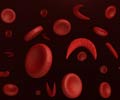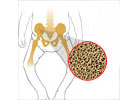Low vitamin B12 diet may increase the risk of infection caused by two potentially deadly pathogens, reveals a new study.

‘Eating a diet with too little vitamin B12 may increase the risk of infection caused by two potentially deadly pathogens.’
Read More..




Despite their simplicity, 1-millimeter-long nematodes called Caenorhabditis elegans (C. elegans) share an important limitation with humans: They cannot make B12 and must get all they need from their diet. In a study published in PLOS Genetics, researchers from the lab of Rice biochemist and cancer researcher Natasha Kirienko describe how a B12-deficient diet harms C. elegans' health at a cellular level, reducing the worms' ability to metabolize branched-chain amino acids (BCAA). The research showed that the reduced ability to break down BCAAs led to a toxic buildup of partially metabolized BCAA byproducts that damaged mitochondrial health.Read More..
A team of researchers studied the health of two populations of worms, one with a diet sufficient in B12 and another that got too little B12 from its diet. Like the second population of worms, at least 10 percent of U.S. adults get too little B12 in their diet, a risk that increases with age.
"We used C. elegans to study the effect of diet on a host and found that one kind of food was able to dramatically increase resistance to multiple stressors -- like heat and free radicals -- as well as to pathogens," said Kirienko, assistant professor of biosciences and a CPRIT Scholar in Cancer Research at Rice.
The lead scientist and co-author of the study, Kirienko said the B12 finding came as a surprise to her team, which first noticed the effect in experiments designed to investigate the mechanisms of pathogenesis of Pseudomonas aeruginosa (P. aeruginosa), a potentially deadly disease in both worms and humans that infects some 51,000 U.S. hospital patients each year, according to the Centers for Disease Control.
Her lab, like thousands of others worldwide, uses C. elegans as a model organism to study the effects of the disease, drugs, toxins and other processes that affect humans and animals. In many C. elegans research labs worms are fed Escherichia coli (E. coli), a common human gut bacteria that is itself a model organism.
Advertisement
"The key difference between the two diets is the ability of HT115 and OP50 to acquire B12 from the environment," said Revtovich, a research scientist. "We showed that HT115 is far more efficient at this, making about eight times as much of the protein that it needs to harvest B12 as compared to OP50."
Advertisement
Lee, a Rice undergraduate student, said the study highlights the need for C. elegans labs worldwide to pay attention to the possible differential impacts of diet on experimental outcomes.
"Some labs use OP50 as their standard food, and others use HT115 or even another strain of E. coli," Lee said. "Our results show there are significant metabolic differences between these diets, and it's likely those differences could contribute to substantial uncertainty in research outcomes."
Kirienko joined Rice's faculty in 2015 thanks to a recruitment grant from the Cancer Prevention and Research Institute of Texas (CPRIT), a state ballot initiative approved in 2007 to provide $3 billion to support cancer research statewide. To date, CPRIT has awarded $2.2 billion in grants to Texas researchers, institutions and organizations through its academic research, prevention and product development research programs.
"This work is related in the sense that it focuses on mitochondrial health," Kirienko said. "In this case, we are working to improve mitochondrial health to help fight infections. For CPRIT, we're trying to do the opposite. We want to damage mitochondria in cancer cells to kill them. So, actually, now that we know this is important, it gives us another potential target in cancer cells."
Source-Eurekalert















